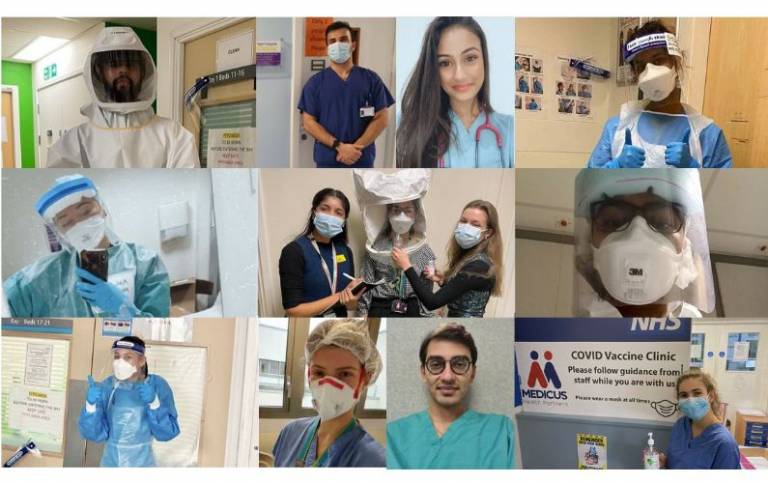UCL medical students playing ‘invaluable’ role on the NHS frontline
28 January 2021
‘We can’t manage without them’, ‘outstanding’, ‘invaluable’, ‘critical’: these are just a few of the words used to describe UCL’s medical students, who have been volunteering in support of the NHS frontline during the ongoing COVID-19 pandemic.

Since March last year, at the start of England’s first lockdown, more than 340 UCL student medics have registered to work as paid or volunteer healthcare support workers - all part of the NHS’s ‘call to action’ for medically trained support.
Through 2020 and continuing now, thousands of hours have been clocked up, working in a diverse range of medical roles including: health care assistants in Intensive Care Units (ICUs), emergency departments and traditional wards; ICU family liaison workers; COVID-19 vaccinators; and GP assistants.
Volunteer work has been carried out at all UCL Medical School partner hospitals; University College London Hospital; the Royal Free London, the Whittington Hospital; North Middlesex University Hospital; and Luton, Dunstable and Lister hospitals (part of East and North Hertfordshire NHS Trust). Other student volunteer work has been conducted at palliative care hospices, GP surgeries and as part of the NHS vaccination programme.
In addition, UCL medical students in years 4, 5 and 6, have been able to use some of their regular and ongoing NHS learning placements to support their clinical teachers to carry out supervised COVID-19 specific work. This aspect is unpaid, but accounts for many more thousands of hours.
Professor Marcel Levi, Chief Executive at University College London Hospitals NHS Foundation Trust, said: “The coronavirus pandemic has proved an extremely intense period for the NHS and capacity and staffing has been stretched beyond anything we have ever experienced.
“Without question, over the past 12 months UCL’s medical students have become an essential and integral part of UCLH; their medical training has ensured we have had enough support to care for our patients during the toughest times.
“No matter what we’ve asked them to do – working in intensive care, acting as family liaison, or helping out on the daily ward rounds – each student has proved reliable, professional and resilient. We simply could not have managed without their support and we thank them all.”
Kate Slemeck, Chief Executive of the Royal Free Hospital, said: "We are so incredibly grateful to the many medical students who have stepped up to become important and highly valued members of our multi-disciplinary teams as part of our COVID-19 response. Medical students have volunteered to be redeployed into the busiest areas of our hospitals, including the intensive care units, where they are providing vital support to our ICU and other clinical teams.
“Medical students have fulfilled a whole range of different roles from offering direct care to patients in a nursing support role, to liaising with family members and facilitating video calls between patients and their loved ones. Our teams have found this support invaluable – and we feel blessed to have worked alongside and experienced the qualities of the future generation of medical staff.”
Professor Carly Fertleman, who is the UCL Medical School undergraduate lead and a Consultant Paediatrician at Whittington Health NHS Trust, said: “All of the UCL medical students attached to the Whittington hospital have been great from the get go.
“We put out a call for volunteers (both paid and not) and we were swamped. They have knuckled down, pitched in and shown real commitment and resilience during the busiest of periods.
“Nearly all of the medical students have also been ‘fit tested’, ensuring they have the right personal protective equipment (PPE) masks, visors and gowns fitting correctly. This continues to be a critical role and three students, having been trained themselves by NHS staff, have taken it upon themselves to run workshops and train others so they are fit tested.
“They’ve all been incredible and an invaluable part of the NHS’ response to COVID-19.”
Dr Samantha Edward, Medical Director of the North London Hospice, went back to working at the Royal Free London in response to the pandemic.
“During the peak of the second wave in January this year, I had the pleasure of working overnight alongside several volunteer medical students on the Intensive Care Unit.As a doctor with 17 years’ experience, working in palliative care, I was struck at the students’ resilience and how they coped and functioned in this challenging setting.
“We worked together as part of a 'turning' or 'proning team' and alongside ICU nurses looking after some of the most sick patients the NHS has ever cared for, in such large numbers.
“I walked away struck by my personal experience. I wanted to recognise the significant contribution the UCL medical students have made for all the patients and colleagues they have volunteered to support. I was beyond proud to work alongside and meet these students whom I am often teaching in my own clinical setting.
“What a role reversal but one that is humbling for us all to have shared. I was immensely proud to work with them and am quite sure they will be outstanding doctors of tomorrow.”
Professor Deborah Gill, Director of UCL Medical School, said: “During the pandemic UCL students have been doing up to 20 hours a week paid volunteer work, this is on top of their student clinical placements hours. We are enormously proud of their contribution to the healthcare community.”
A number of UCL medical students have written about their roles and experiences on the frontline and provided photos. You can find more information here: Student medics step up to support the NHS.
Links
Image
- Photos provided by UCL medical students
Media contact
Henry Killworth
Tel: + 44 (0) 7881 833274
E: h.killworth [at] ucl.ac.uk
 Close
Close

